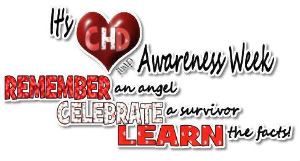February is Congenital Heart Defect Awareness
Lots of loving things for our family to celebrate this month. Mike and I will celebrate 8 years of marriage on the 16th.
We’ll share heart shaped pancakes on February 14th, and probably a few Hallmark cards, as I am sure many of you will.
Did you know that February 14th is also CHD (Congenital Heart Defect) Awareness day?
As everyone by now knows, Kathryn was born with a significant heart defect. At our 20 Week ultrasound Kathryn was diagnosed with HLHS (Hypoplastic Left Heart Syndrome) Which is a pretty scary diagnosis but, a treatable one. Unfortunately that diagnosis was wrong and Kathryn was actually born with Restrictive Cardiomyopathy, which at this time there is no surgical fix, her only option is a heart transplant.
Luckily Kathryn has proven to us what a miracle she really is. She has beaten all the odds and is clinically doing very well. At her last cardiac clinic, I asked Dr. Marx when he thought we would be looking at for a time frame for a new heart. His response was: I just don’t know, I can’t answer that. Most kids with Kathryn’s diagnosis need a new heart within the first 6 months of getting diagnosed. Kathryn isn’t most kids.
February 7th - 14th is National Congenital Heart Defect Week
Most all people know that February is National Heart Month. We are all familiar with wear Red Dress Day, we are all familiar of the importance of understanding adult and youth acquired heart disease. It is a well known fact that heart disease is the #1 killer among women.
Because everyone relates February with Valentine's Day and love, chocolate candy hearts, and the color red it only makes sense February would be chosen as National Heart Month. But if you were to go ask the average person on the street if they ever heard of Congenital Heart Defects, I am sure the response would be very different from those asked about acquired heart disease.
By no means do I want to down play the importance of acquired heart disease and the need for prevention and intervention. But we do need to make aware the need for more research and awareness to those who are BORN with Congenital Heart Defects. It is not lifestyle or age that bring on these defects, and there is NO way to stop it from happening.
To the parents who have a child born with a heart defect it is mind blowing how little awareness there is for the #1 Most Common Birth Defect. Fortunately, recently there has been a greater amount of funding going into CHD research, however, there is still a much greater need for more.
Please help join in the Awareness this month and pass this information on.
- Congenital Heart Defect (CHD) is a defect of the heart present at birth.
- CHD's are the #1 most common birth defect, affecting 1 in every 100 babies born.
- CHD's are the #1 most common cause of infant death related to birth defects within the first year of life.
- There are at least 35 different known Congenital Heart Defects.
- 1 in 10 born with a CHD will have a fatal defect.
- There is no known cause for CHD's, however, genetics and environmental factors can play a role in the defects. Scientist have been able to discover over 100 mutations that are directly linked to the heart.
- There is no known cure or prevention for CHD's. Most born with heart defects will require some form of palliative surgical intervention.
- Through research and medical advancements the mortality rate after surgery has significantly decreased in the past 20-30 years. On average it is about 5% compared to the 30% it was.
- There are an estimated 1 - 1.2 million living with a CHD in the US.
- Nearly twice as many children die each year from CHD's, than from all forms of childhood cancers combined.



2 comments:
I found your blog while searching the web for other kiddos like mine! Just wanted to say she is ADORABLE and I am so blessed to hear she is a strong little one!
I will be sure to follow your blog, and God bless you!
Hi, I found your blog while searching for Restrictive Cardiomyopathy. I am 22 and was recently transplanted, but had had the RCM since birth. The transplant is not as bad as one would think. Where are you near/where is your hospital. Are you seing a transplant cardiologist?
Post a Comment